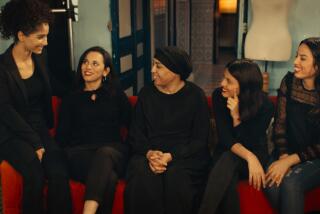Egypt May Force Feminist to Divorce
- Share via
CAIRO — Since Nawal Saadawi, Egypt’s most outspoken feminist, first started writing about women’s issues more than 30 years ago, she has been thrown in jail, stripped of her job, even forced to flee the country for a time because of her controversial views.
Now her critics are trying to take away her husband.
Relying on an obscure and rarely applied Islamic principle called hisba, a lawyer here has filed suit against the fiery author seeking to have her forcibly divorced from her husband of 37 years on the basis of statements she made that the attorney says are insulting to Islam.
The lawsuit is only the second time in modern Egyptian history that hisba has been sought and, as in the first case, this one targets an academic whose ideas infuriate fundamentalists.
Saadawi’s supporters say a judge’s decision last week to consider the suit is another sign of a pervasive spirit of repression in Egypt. Just last month, a court sentenced a prominent Egyptian American professor, Saad Eddin Ibrahim, to seven years in prison in part because it said his efforts to promote civil rights made Egypt look bad.
“Even a madman would not have thought to do this if he did not have support,” said Dr. Sherif Hetata, Saadawi’s husband. “It is linked to the general atmosphere in the country, the growth of fundamentalist culture.”
The lawyer behind the suit, Nabih Wahsh, says he is not a fundamentalist but an average Muslim who “loves and respects Dr. Saadawi” but feels that he must stop her because she has crossed a red line.
“If I told her she has to wear a veil, that would not be right--that is her decision to make,” Wahsh said. “If I asked her why she is not praying, that would not be right. But if she wants to advise people not to wear the veil or not to pray, then I think I should stop her.”
Wahsh denied that he filed the suit to drum up publicity for his law practice.
Everything about Saadawi is a challenge to the ruling class, from her shock of uncovered shoulder-length white hair to her 40 books that delve into taboo subjects such as women’s sexuality. She calls the most prominent religious officials here “sexually frustrated men” suffering from “sexual mania.” She says the practice of veiling women is a holdover from the slave trade. She rails against female genital excision, widely practiced here. And she is an outspoken critic of the government.
But it was a March interview with a local newspaper, Al Midan, that landed her in the current predicament. Saadawi said the Muslim practice of making a pilgrimage to Mecca and kissing a stone once kissed by the prophet Muhammad is a “remnant of idolatry.”
“It’s paganism,” Saadawi said during an interview Monday with The Times, recalling her own visit to Mecca. “I saw people kissing the stone. I was offended. Islam started by breaking stones.”
When those thoughts were printed, Saadawi found herself confronted by the same sort of challenge once faced by Nasr abu Zeid, a former professor of Arabic literature at Cairo University. In May 1992, Abu Zeid presented the tenure committee with his published works. Instead of a promotion, he became the first person targeted for hisba because some fundamentalists thought he promoted atheism.
According to religious scholars, hisba is a concept mentioned in the Koran that in effect allows individuals to police their neighbors for religious piety. However, there is some dispute about who has the right to file such actions and whether it should be restricted to the government or to clerics.
In the Abu Zeid case, it first appeared that the government and the courts were on his side. But in 1996, the nation’s top court declared him an apostate--someone who renounces his or her faith--and therefore not allowed to be married to a Muslim. Abu Zeid and his wife fled the country and have not returned.
In an effort to appease fundamentalists and still place some control on the practice, the government passed legislation that year permitting only the state prosecutor to pursue such actions. At first it appeared this law would shield Saadawi, who has explored issues such as feminism, aggression against women and girls, prostitution and Islamic fundamentalism in works that include “The Hidden Face of Eve” and “Women at Point Zero.”
When Wahsh took up the case, he was rebuffed by the general prosecutor, who said there was no evidence that Saadawi was an apostate. But the lawyer went to court and, to the surprise of everyone, including Wahsh, Judge Hussein Wakeel of Cairo’s Personal Status Court agreed to consider the matter. A final decision is scheduled for July 9.
“I only wish she would come forward and say, ‘Yes, I said these things and I regret them,’ ” said Wahsh, who has become so prominent since filing the suit that he recently was hired to defend a newspaper editor arrested for printing 14 photographs purporting to show a Coptic Christian monk having sex with women he then blackmailed.
But Saadawi is unlikely to apologize any time soon. She has long been a thorn in the establishment’s side. A medical doctor and sociologist, she was fired from her post as national director of public health in the 1970s and jailed for several months as a political prisoner in the early 1980s. She founded the Arab Women’s Solidarity Assn. in 1981, only to have the organization banned 10 years later for opposing U.S. involvement in the Persian Gulf War.
If the judge finds against her, she and her husband are planning to go home from court and live as if the whole thing never happened. They are prepared to put the government in the awkward position of having to throw them in jail--and further tarnishing its reputation internationally--or leave them alone, thus angering fundamentalists.
“We will not be separated, and we will not leave,” she said.
More to Read
Sign up for Essential California
The most important California stories and recommendations in your inbox every morning.
You may occasionally receive promotional content from the Los Angeles Times.













